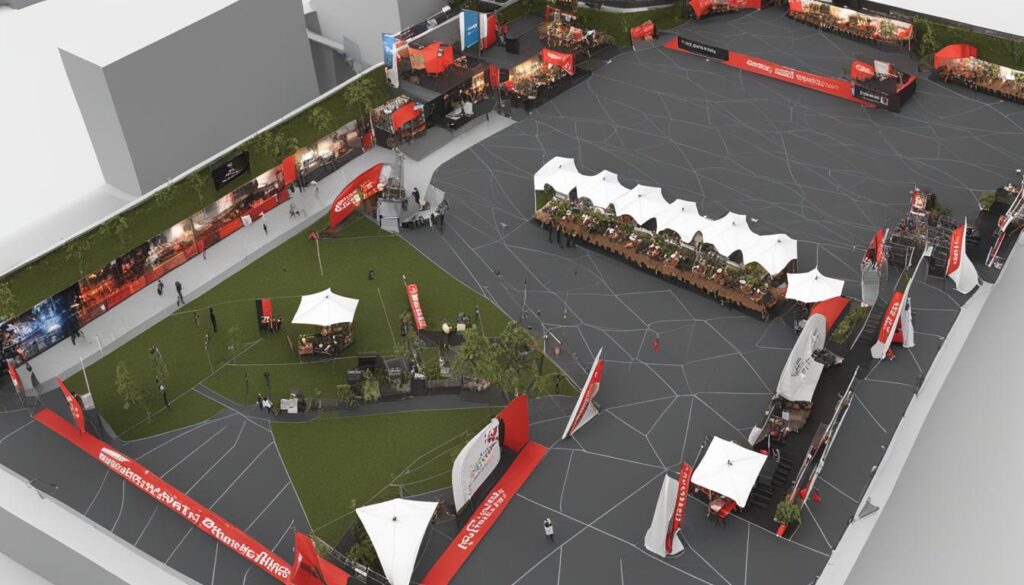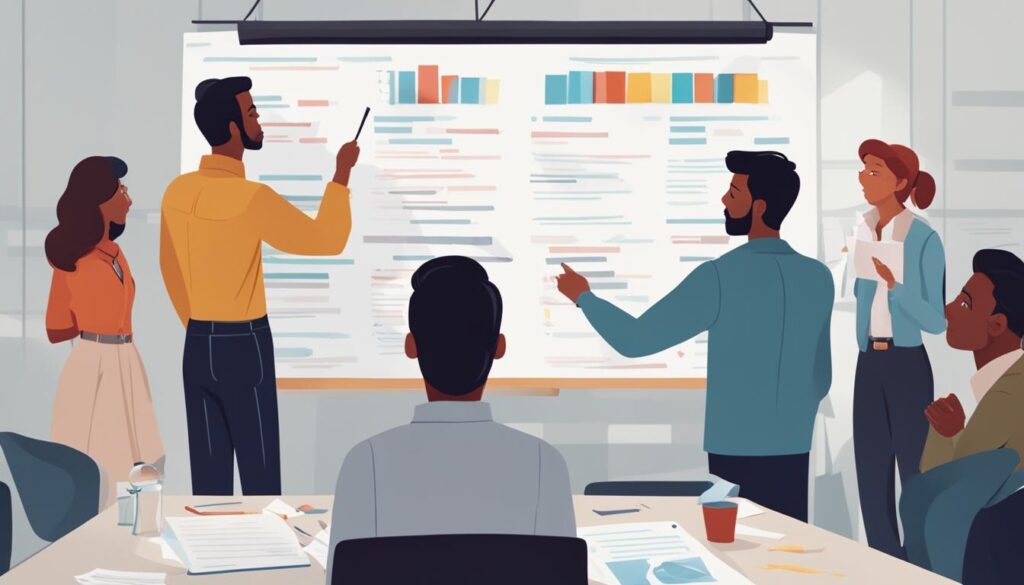We may earn money or products from the companies mentioned in this post.
Planning an event can be a daunting task, with several moving parts that need to be managed to ensure its success. One crucial aspect of event planning is vendor and exhibitor coordination. This involves managing the logistics of vendors and exhibitors, facilitating their participation in the event, and ensuring their needs are met. Strong vendor and exhibitor coordination can make the difference between a mediocre event and a truly successful one.
Effective vendor and exhibitor coordination requires careful planning and attention to detail. It involves managing vendor logistics, providing support to exhibitors, and ensuring open lines of communication throughout the event. Event vendor management and vendor logistics are also important aspects of this process that require careful planning and execution.
Key Takeaways:
- Efficient vendor and exhibitor coordination is crucial for event success.
- Event vendor management and vendor logistics are critical components of this process.
- Effective communication is key to ensuring successful vendor and exhibitor coordination.
- Providing timely and adequate support to vendors and exhibitors is important for event success.
- Utilizing vendor coordination services can help streamline the coordination process and ensure a successful event.
Strategies for Successful Vendor and Exhibitor Coordination
Efficient vendor and exhibitor coordination is crucial to ensuring the success of any event. However, managing vendors and exhibitors can be a challenging process. Utilizing vendor coordination services and solutions can help streamline the process, and this section will provide strategies for successful vendor and exhibitor coordination.
Establish Clear Communication Channels
Establishing clear communication channels is essential for effective vendor and exhibitor coordination. Before the event, ensure that all vendors and exhibitors have access to relevant contact information and communication tools. Consider setting up a dedicated communication platform, such as a vendor portal or event app, to streamline communication.
During the event, designate a point person to handle vendor and exhibitor communication. This person should be available and responsive to vendors and exhibitors throughout the event, providing support and assistance as needed.
Set Expectations
Setting expectations is another critical strategy for successful vendor and exhibitor coordination. Make sure vendors and exhibitors are aware of all relevant event information and logistics, including load-in and load-out times, booth set-up requirements, and any rules or regulations they must follow.
Clearly define the roles and responsibilities of event organizers and vendors/exhibitors, such as who is responsible for providing necessary equipment and supplies. Providing vendors and exhibitors with a detailed vendor/exhibitor manual or handbook can help ensure everyone is on the same page.
Provide Necessary Support
Providing necessary support is also key to successful vendor and exhibitor coordination. Consider offering a range of support services, such as technical assistance or marketing support, to help vendors and exhibitors succeed.
Additionally, ensure that vendors and exhibitors have access to all necessary resources, such as electrical outlets, internet connectivity, and onsite storage. Providing amenities such as food and beverage or designated rest areas can also help enhance the vendor/exhibitor experience.
Highlight the Role of Exhibitor Management
Effective exhibitor management is essential for creating a positive experience for both vendors and attendees. Consider offering services such as pre-event training, networking opportunities, and marketing and promotional support to help exhibitors succeed.
Designate a point person to manage exhibitors and provide support and assistance throughout the event. This person should be available and knowledgeable about all aspects of exhibitor management, including booth set-up and teardown, on-site logistics, and post-event follow-up.
By implementing these strategies and utilizing vendor coordination services and solutions, event organizers can successfully manage vendors and exhibitors, providing a positive experience for all involved.
Establishing Strong Vendor Relationships
In event planning, establishing strong vendor relationships is crucial for success. Maintaining long-term partnerships with vendors can enhance event effectiveness, efficiency, and profitability. Effective vendor relationship management involves building trust and transparency, open communication, and mutual respect. By cultivating strong vendor relationships, event planners can ensure vendor satisfaction, foster loyalty, and increase the likelihood of vendor referrals.
Strategies for Effective Vendor Relationship Management
There are several strategies event planners can utilize to establish and maintain strong vendor relationships:
- Be Transparent: Be honest about event goals, budgets, and expectations. By setting realistic expectations and clear objectives, vendors can better align their services with event needs.
- Communicate Regularly: Maintain open lines of communication throughout the event planning process. Keep vendors informed of any changes or updates and provide prompt responses to their inquiries or concerns.
- Understand Vendor Capabilities: Be aware of each vendor’s strengths and limitations. Don’t overload vendors with tasks they are not equipped to handle, and play to their strengths to ensure the best possible outcome.
- Provide Feedback: After the event, provide vendors with feedback on their performance. Even if the feedback is constructive criticism, it can help vendors improve their services and foster a positive long-term relationship.
The Benefits of Strong Vendor Relationships
Building strong vendor relationships can result in several benefits for event planners:
| Benefits | Explanation |
|---|---|
| Increased Trust | By building trust with vendors, event planners can rely on them for quality services and timely delivery. |
| Better Negotiations | With a positive vendor relationship, event planners can negotiate better terms, pricing, and benefits. |
| Enhanced Event Quality | When vendors understand event goals and expectations, they can better align their products and services to create an enhanced experience for attendees. |
| Improved Efficiency | With established vendor relationships, event planners can streamline vendor communications, reduce redundancies, and improve operational efficiency. |
Overall, effective vendor relationship management and strong vendor relationships are critical components of successful event planning. Event planners who cultivate strong vendor relationships can create better events, reduce stress, and increase profitability. By leveraging vendor coordination services, event planners can ensure they are providing the best possible experience for both vendors and attendees.
Streamlining Vendor Logistics
Efficient vendor logistics are crucial to ensure a smooth operation during events. Properly managing vendor logistics can help avoid disruptions and delays that may negatively impact the overall event experience. Here are some key considerations for effective vendor logistics management:
| Consideration | Description |
|---|---|
| Load-In and Load-Out Processes | Efficient load-in and load-out processes are essential to ensure that vendors have adequate time to set up their booths and equipment without causing congestion or delays. Proper planning and coordination with venue staff can help ensure a smooth load-in and load-out process. |
| Booth Setup and Teardown | Effective booth setup and teardown processes are critical for ensuring that vendors have enough time to set up their booths and equipment before the start of the event and dismantle them afterward. Clearly communicating setup and teardown times can help avoid confusion and delays. |
| Coordination with Venue Staff | Effective communication and coordination with venue staff can help ensure that vendors have access to the facilities and resources they need to set up their booths and equipment. Any issues or concerns should be addressed promptly to avoid disruptions. |
In addition to the above considerations, trade show exhibitor services can also help streamline vendor logistics. These services typically provide support for exhibitors, including booth design and setup, freight handling, and onsite support. By utilizing these services, event organizers can ensure that vendors have the resources they need to succeed.
Overall, effective vendor logistics management is critical to ensure a successful event. By streamlining vendor logistics and utilizing trade show exhibitor services, event organizers can help ensure a positive experience for both vendors and attendees.
Effective Communication and Information Sharing
Clear and effective communication between event organizers, vendors, and exhibitors is essential for successful vendor and exhibitor coordination. With the help of modern technology, event management software can facilitate real-time information sharing and streamline communication processes. These vendor coordination solutions can enable all parties to receive essential updates and relevant information in a timely and efficient manner, enhancing the overall event experience.
One of the primary advantages of using event management software is that it enables event organizers to manage vendor and exhibitor registration and track their participation in the event. Additionally, the software can be used to convey essential information such as event schedules, logistics, and promotional materials.
To ensure that vendors and exhibitors receive the necessary support, exhibitor coordination services can be utilized for managing communication between exhibitors and event organizers. These vendor coordination services act as a liaison between event organizers and exhibitors, handling everything from logistical support to providing event details and updates.
“Clear and effective communication is the key to success in vendor and exhibitor coordination.
Ensuring Vendor and Exhibitor Satisfaction
Ensuring vendor and exhibitor satisfaction is a crucial aspect of successful event planning. It involves addressing the needs of your vendors and exhibitors, providing timely support, and gathering feedback to improve future events.
Effective vendor coordination services and exhibitor coordination services play an essential role in ensuring a positive experience for your vendors and exhibitors.
One way to ensure vendor and exhibitor satisfaction is to provide a dedicated point of contact to address any concerns or questions they may have. This could be a staff member or a vendor coordination specialist who can provide timely and efficient support throughout the planning process.
It’s also important to gather feedback from vendors and exhibitors after the event. This helps to identify areas for improvement and ensure that their needs were met during the event. Consider sending out surveys or conducting follow-up calls to gather feedback and show that you value their opinion.
In addition, providing amenities and services, such as complimentary meals, transportation, and Wi-Fi, can enhance the overall experience for vendors and exhibitors and contribute to their satisfaction.
Troubleshooting and Conflict Resolution
In any event planning process, it is vital to have a strategy for troubleshooting and conflict resolution in place. While every effort may have been made to ensure effective vendor coordination, unexpected issues may arise.
To mitigate these issues, proactive problem-solving and effective negotiation techniques should be employed. Maintaining open lines of communication with both vendors and exhibitors is also essential to resolve conflicts in a timely manner.
Vendor coordination services can play a pivotal role in this process. These services offer expert guidance and support to event planners, particularly in cases where conflicts with vendors may arise. They provide a buffer between the vendor and event organizer, taking on the responsibility of addressing and resolving issues that may emerge.
The Importance of Vendor Relationship Management
Another key element in conflict resolution is maintaining strong relationships with vendors. Building long-term partnerships with vendors can enhance the success of an event. Furthermore, the event planner can leverage these relationships to resolve issues in a more efficient and effective manner.
Vendor relationship management involves nurturing and caring for vendor relationships, establishing open communication channels, and managing expectations. By prioritizing positive vendor relationships, event planners can ensure a smooth and enjoyable experience for everyone involved.
Conclusion
Efficient Vendor and Exhibitor Coordination is crucial in event planning, and ensuring a smooth and successful event experience for all participants. This involves managing vendor logistics, establishing strong vendor relationships, and providing effective communication and information sharing.
Utilizing vendor coordination services and exhibitor coordination services can greatly assist in achieving successful Vendor and Exhibitor Coordination. These services can help facilitate clear communication channels, problem-solving, and troubleshooting, resulting in a positive experience for both vendors and attendees.
Effective Vendor and Exhibitor Coordination is key to achieving a successful event, and implementing effective strategies can help create a seamless and enjoyable experience for all involved. By streamlining vendor logistics, establishing strong relationships, and ensuring satisfaction, event planners can create an atmosphere of trust and professionalism, leading to long-term partnerships and successful events.
Thank you for reading this article on Vendor and Exhibitor Coordination, and we hope you have found it informative and useful in your event planning endeavors.
FAQ
What is vendor and exhibitor coordination?
Vendor and exhibitor coordination refers to the process of managing and organizing vendors and exhibitors at an event. It involves tasks such as vendor selection, contract negotiation, logistics planning, and communication to ensure a smooth and successful event.
Why is vendor and exhibitor coordination important in event planning?
Vendor and exhibitor coordination is crucial in event planning to ensure the seamless execution of the event. It helps maintain clear communication between organizers and vendors, ensures timely setup and teardown of booths, and creates a positive experience for both vendors and attendees.
What are some strategies for successful vendor and exhibitor coordination?
Successful vendor and exhibitor coordination can be achieved by establishing clear communication channels, setting expectations from the beginning, providing necessary support to vendors, and utilizing technology solutions for efficient information sharing.
How can strong vendor relationships be established and maintained?
Building strong vendor relationships involves regular communication, delivering on promises, and treating vendors as valued partners. Maintaining transparency, timely payments, and addressing concerns promptly also contribute to fostering strong relationships.
What are vendor logistics and why are they important?
Vendor logistics refer to the management of vendor-related operations, such as load-in and load-out processes, booth setup and teardown, and coordination with venue staff. Efficient vendor logistics are crucial for the smooth functioning of an event and ensuring vendor satisfaction.
How can effective communication and information sharing contribute to vendor and exhibitor coordination?
Effective communication and information sharing facilitate seamless vendor and exhibitor coordination. Utilizing event management software and implementing solutions for real-time communication helps streamline processes and ensure timely sharing of important event-related information.
How can vendor and exhibitor satisfaction be ensured?
Ensuring vendor and exhibitor satisfaction involves addressing their needs, providing timely support, and gathering feedback to improve future events. Utilizing vendor coordination services and exhibitor coordination services can help enhance their experience and overall event success.
What are some strategies for troubleshooting and conflict resolution in vendor and exhibitor coordination?
Proactive problem-solving, effective negotiation, and maintaining open lines of communication are key strategies for troubleshooting and conflict resolution. Engaging vendor coordination services can also help mitigate conflicts and maintain positive vendor relationships.
What is the importance of vendor coordination services and exhibitor coordination services?
Vendor coordination services and exhibitor coordination services provide specialized expertise in managing vendors and exhibitors, ensuring efficient operations, and enhancing their overall experience. These services contribute to the success of events and assist in maintaining positive vendor relationships.
Affiliate Disclosure: This post may contain affiliate links. If you purchase through our link, we may receive a small commission, but at no additional cost to you. For more information, please see our Disclosure statement.



